Yesterday evening, I attended the Founder2be event at Lekki. Founder2be is a global co-founder finding service that hosts networking mixers for startup founders looking for co-founders, and the first Nigerian edition was organised by Chinedu Onyeaso and Emeka Akano. Overall, it was a good experience. On my way to the venue at Lekki — which was bloody far, by the way — I spent some time penning down some of my personal feelings about co-founding startups.
My first co-founder was from university, and we’d been friends for nearly two years. Ayo was the kind of friend whose room is your room, and vice versa. We started our “media” business from the desktop CPU I begged my father to allow me take to school, a borrowed 17 inch and monstrously heavy beast of a monitor that had to be lugged a few hundred yards to Seun Alawode’s shop as Satellite junction, one of the rare places where electricity existed in UNAD at the time, and a N100,000 loan from my friend’s mother.
While we broke even and repaid our debt financing in our first year of doing business, we spent a lot of time re-investing in equipment, staff and even losing clear profits to unforeseen contingencies. It took a while to even out and figure out a killer business that made money on almost autopilot. By that time we were in our final year, and it was time to graduate.
When it looked like I wouldn’t make the grade in Jurisprudence, which would mean an extra year, I wasn’t bothered in the slightest. I had a business that I loved and it was going to make me lots of money in that extra year. But I eventually graduated with a 2.1 and had to leave it all behind for Law School.
Founding and running ideaMEDIA with Ayo was one of the highest points in my life. Looking back now, I am certain it would never have amounted to anything if we had not been friends from the first.
From my experience, I’ve come to believe that the process that creates sustainable co-founding relationships is substantially organic. Make no mistake however…this isn’t the sort of organism that you can culture in some 48-hour hackathon petri dish. Co-founders that stay together will have typically have some personal history together, have mutual career interests and be close in communication in the same space till they practically start completing others’ sentences. I’m serious. I could almost swear that Ay and I had a pyschic link. Many times one person would say something that was just on the tip of the others’ tongue.
It’s not that these are necessary and sufficient conditions. Their presence or absence by no means guarantees the success or failure of a venture. It’s just that the founding parties of most successful companies tend to have had medium to long standing friendships before starting out. If you were to take an anecdotal sample of successful co-founded companies, they typically didn’t happen in artificially engineered circumstances. Systrom and Krieger met at Stanford and were already bouncing ideas off each other way before they decided to do Burbn, turned Instagram, together (goto para. 10). How about Steve and Woz? Bill Gates and Paul Allen?
As you might have noticed, an individual’s social network while they are in and even after university are crucial. College is often where associations that open doors of opportunity in future career pursuits, including founding a business, are formed. The Facebook founder mafia? They were Harvard dorm-mates. The Google guys? Same Stanford Ph.D class. These networks take a while to build. So good luck replicating years of social network accretion in a 48 hour hackathon.
It didn’t take long for the Founder2be event to sell out on Eventbrite, and I only got in because Zubair, via no prompting of mine, decided to intro me to Chinedu. That told me something we already know. Many startup founders are looking for co-founders. But the reason they are having trouble, in my opinion, is that they haven’t taken the time to invest in building the offline relationships and professional/casual networks that are relevant to their space, in advance, even before the thought of founding a business occurs.
I’m not entirely subscribed to the idea of networking blind dates for the sole purpose of snagging a startup co-founder, for a couple of reasons.
First — why do you think blind dates in the real sense popularised by reality tv shows have low marriage conversion rates? Well because lasting relationships rarely happen overnight, and love at first sight is a unicorn. I’ve translated enough online relationships offline to know that it doesn’t matter how awesome people look or sound on social media. Besides, how do you know if you and that Twitter acquaintance of two weeks have a the kind of personality/mentality/ideology fit that will allow you found a business together?
Another thing that makes me skeptical is the people who attend these events will usually have started something or at least have an idea in their heads. Because you had the idea first, it is YOUR idea. Yours. In fact some founders make a point of reminding the other guys that the company was their brainchild. If you’re looking for people to hitch along just for the ride, can you reasonably expect them to take equal ownership (responsibility, not equity, that’s another matter entirely), in the success of the venture? Do you think they would be equally invested to the same emotional degree as you are? That’s profoundly different from a business that was built around a shared epiphany, which is more often the recipe for true startup magic.
Having said that, I’m optimistic about Founder2be, and for one simple reason. The best time to plant a tree was 20 years ago. The next best time is now. The brave pioneering efforts of actors like the CcHub and Mobile Monday Nigeria can never be downplayed, but our ecosystem is still at that stage where there is really no “ecosystem”, in the true sense of it. Just lots of people who happen to play in the same space, often oblivious to their competition, co-opetition and potential synergists. Yesterday, I met quite a few people I’d never encountered previously within my personal tech network, and I think with a few tweaks and consistency, the event and the community that hopefully emerges from the broken ice could lead to many interesting transactions.
One of TechCabal’s overarching goals is to help complete the ecosystem, so that among other things, people can connect to people. We’re working on a number of things to that end. Stuff that will become very apparent shortly. Stay tuned.
This post is dedicated to my friend and first co-founder, Ayo. He got married this past Saturday. I’m sorry I couldn’t be there for you this time, my man.
The best of TechCabal, in your inbox weekly. Don’t miss a thing. Subscribe now.


















